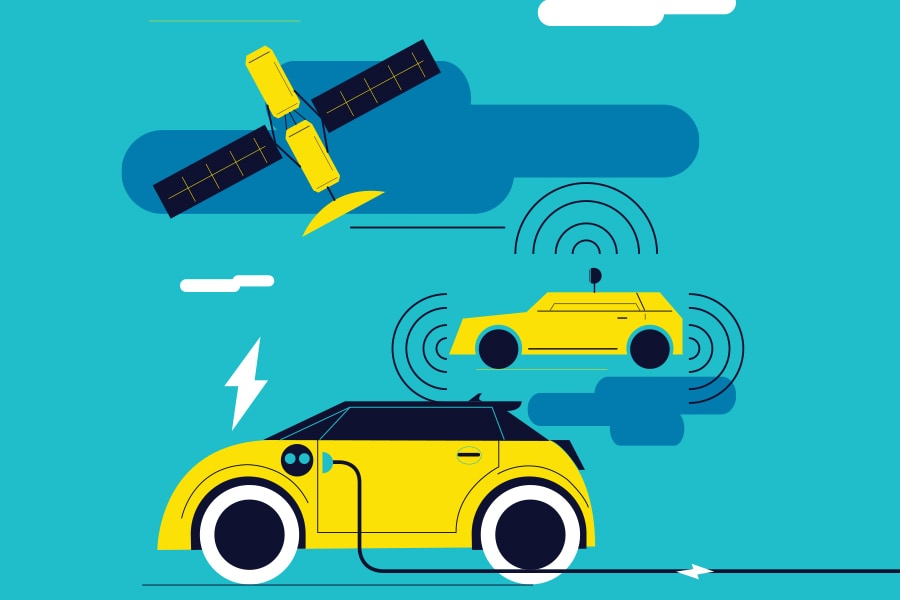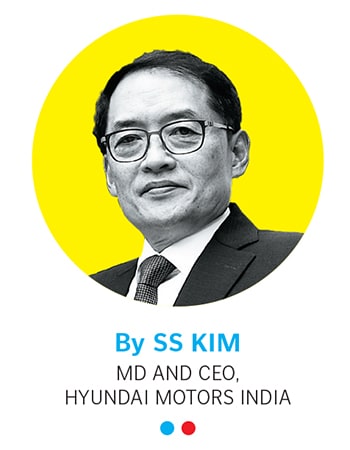'2020 will be defined by electric car acceptance': Hyundai's SS Kim
The auto industry will see new mobility trends with the emergence of a highly connected and mobile Gen Z, says Hyundai Motors India MD and CEO


 Illustration: Sameer Pawar[br]
Illustration: Sameer Pawar[br]
Discerning millennials want more in terms of technology and value for money. Similarly, they are also aware of the surroundings and environment overall. And the automobile industry is duty-bound to appreciate what they want. In the days to come, green and smart mobility is going to define the whole sector as millennials believe in social brands that offer real value to society and people.
As far as the Indian automobile sector is concerned, it cannot be isolated from the world. Or for that matter, it cannot be isolated from the overall economy either. The cyclically muted demand in 2019 has been one of the challenges the automobile sector too faced, like the other sectors did. However, everyone is now cautiously optimistic for the new year as the last quarter has started to provide better signals.
While there are challenges, the Indian market gives leading companies a lot of opportunities too to innovate and implement new ideas to prepare for the future. As one of the most dynamic and fast-growing markets, ‘shared’, ‘connected’ and ‘zero-emission mobility’ are the future of the Indian automobile industry. The government’s push for clean mobility is the right way to go.
The significant market contours that are going to get a boost are the electric vehicles (EVs) segment, the transition from BS-IV to BS-VI, and the technological advances that are going to make automobiles dramatic agents of future mobility. Connected cars and EVs made good headway in 2019, but these are not abrupt events. These are the result of the groundwork laid by the sector over the last few years. Similarly, the ongoing R&D is going to define the future of mobility.
The next decade will be extremely instrumental for the global and Indian auto industries as we will witness the fourth industrial revolution. The auto industry will see new mobility trends with the emergence of Gen Z who are connected and highly mobile. Customer choices will rapidly change towards new formats of mobility and original equipment manufacture (OEM) focus will be towards future smart technologies coupled with smart services. Electric mobility solutions will have customer acceptance in the near future, however the ultimate private mobility solution lies with fuel cell electric vehicles. The Smart Mobility Device business will supply products optimised for the services and lay the groundwork to help foster the service business.
Competition in the 2010s led to better car technology": Maruti"s RC Bhargava
On the other hand, the Smart Mobility Service business will provide personalised content and services on devices to help secure a broader customer base. For cost innovation, Hyundai will adopt a new global modular EV architecture to enhance efficiency and scalability of product development, starting with vehicles being launched in 2024. The company also has plans to revamp its sales model through network optimisation and new sales methods, to optimise production based on demand, and to expand partnerships with other OEMs.
Hyundai has already embarked on a global journey under the new roadmap, named Strategy 2025. The company will foster Smart Mobility Device and Smart Mobility Service as its two core business pillars and the synergy between the two pillars is expected to facilitate the company’s transition into a smart mobility solution provider. Hyundai will build an integrated mobility platform that analyses data from in and around the vehicle through car connectivity. Through an enhanced understanding of customers, the company will offer services tailored to the needs of customers in every aspect of their lives, including shopping, delivery, streaming, and multi-modal mobility services.
Smart Mobility Device includes a wide range of product groups beyond automobiles, such as personal air vehicle (PAV), robotics, and last-mile mobility. The automotive sector will have to fortify its manufacturing capabilities to build products that offer millennials a seamless mobility experience. Smart Mobility Service is an area that will be a key pillar in the future of the automotive sector. Services and content will be personalised and offered through an integrated platform to maximise value for new-age customers.
How the smartphone became ubiquitous in the 2010s: Vivo India"s CEO
But, is investing in a future roadmap mean ignoring the present? The answer is an obvious no. The present challenges are something that need to be addressed keeping the general sensitivities in mind. For example, the transition from BS-IV to BS-VI is probably a good move in the present context. However, moving to electric mobility or fuel cell technology is the best solution in sight as of now. What is important here is that the supporting infrastructure is an absolute necessity for moving into the next gear. For this, every stakeholder—government, manufacturers, civic society, and the public at large—need to do their bit.
One of the significant highlights of the last decade’s best years was the growth and acceptance of the compact premium segment of cars. Bucking the slowdown, this segment has now become the poster child of automobile resilience and a clear preference for the mid-segment buyer.
As the new decade dawns and progresses, every stakeholder in the automotive sector will have to focus on a very important deliverable: Customer experience. The auto sector will have to ensure that enhanced, enriched, and fulfilling customer engagement becomes its core direction as Indian millennials and Gen-Z are the new-age customer with a unique outlook towards life. As an innovative and technology-led and technologically inspired sector, all of us have to continue to invest heavily in upscaling and upgrading all our channels: From the shop floor to the plant floor. India, in the next decade, will be an even more integral part of the global economy, and the automotive sector should provide it with the necessary leverage to make it so happen.
First Published: Jan 10, 2020, 09:31
Subscribe Now